What are the service providers of data centers, and how to choose the best?

Igor Myzgin (Servers.ru)
I will talk about providers of data centers and how to choose the best. Why optimal, I will tell a little later.
I will talk about what a data center is like a business (this is my definition, which I propose to discuss); what services are provided by data centers; what the customer needs from the data center; how to compare the incomparable. I will also propose an algorithm that, I believe, helps to choose a data center provider better than the algorithm that is commonly used by most people who are trying to buy data center services.

')
Two moves - one fire. We take a project - a few dozen servers, IP-addresses, there are DNS'y. We want to move it somewhere sharply. Transferring a medium and large project without down-time is hard, not always it turns out quickly. Everyone, probably, has experience, as he successfully transferred or transferred it successfully, but not to the end. Accordingly, various legends go when people transported physics, when people did something wrong in DNS, but two moves — one fire — there is such a problem.
The second problem is the inability to check the quality of the data center service before you use it for some time. Therefore, the option is such that “we first go to data center 1, try to work with them, we don’t like something, we move to data center 2, we’ll try there, we’ll work, we don’t like it either, we go to center 3, and we will like everything there ”- this option is very sick, because two moves are one fire.
Why are we talking about how to choose the right data center? Because it is not the easiest task, it is not the easiest topic.
Why am I talking about this? Because for 15 years I have been involved in data centers - I exploited them, I built them, I bought them, I sold their services in Russia, I sold their services not in Russia. Accordingly, I have gained some experience, which I tried to structure in the HighLoad Junior format. Those. This presentation is quite basic, it’s introductory, relatively speaking, and most of the time, I’ll probably say obvious things, but I just tried to structure them. Just like some kind of experience in the format of the HighLoad learning track.
There are three problems in the data center market.

The first problem is everyone is lying. What does it mean? This means that in any data center there is a sales department, there is a marketing department, there are some technical people who created this business. They believe that they are strong in something. And they say: “We are very strong in something. And therefore it is very important for everyone, everything else is not important. ” Any marketing, advertising the services of its data center, will bend to what he does best, in their opinion, they will keep silent about everything else. Those. the truth is not said - we can assume that they are a little lie, so I said so provocatively - everyone lies. Those. in fact, they all embellish the good, hush up the bad, and everywhere self-advertise on something like that. Everyone finds some topic - “Oh, we must be strong in this topic” - and its PR.
From this there is a logical consequence - when you have a hammer in your hands, everything turns into nails. Any data center, as a service provider, has its own specialization, some established practice, likes something, knows something, knows how to work with something. And when a client comes to them and says: “I want to solve some of my task,” people from data centers remember that they can, and try what they can, to pull on the task that a potential client has. Sometimes it works, sometimes it fails.
And the third problem of the data center services market - the ideal provider and the ideal client does not exist.
If you now ask: "Is this data center the best?". Unknown. “And if we compare this data center and this data center, which one of the two is the best?” Unknown. Because, conditionally speaking, there is no criterion by which it can be said that this data center is better than that one. Those. this data center, relatively speaking, maybe worth 1000, and this - 2000, one is better than the other? One is physically bigger. In this data center there can be 10 providers, and in this - 12. 12 more than 10, but who said that these 12 are better than these 10 in terms of connectivity? Due to the fact that the data center provides a pool of various services, and no one data center provides services equally well, it is impossible to compare two data centers linearly, in a matrix somehow.
And in the same way, two identical customers do not exist, all customers want something different. Since I have been selling data center services for the last 6-7 years, I ask questions: “What do you want to do?” and “Why do you want to do this?”. I get two answers and periodically I do not see a logical connection between what people want and why people want it. But people see the connection, they understand it, they explain it - people have a logic.
Everyone thinks differently, so two identical customers do not exist, there are no two ideal providers, all are incomparable with each other. Even if we say that data center 1 is better than data center 2 and justify it, and we say that data center 2 is better than data center 3, and also somehow justify it, then justify that -center 1 is better than the data center, we can not.
Thus, there are three problems in the data center services market. It seems to me that they are.
What do you think, what is a data center as a business? What does it consist of?

I propose the following definition - a data center as a business consists of two elements: the first element is the provision of infrastructure for rent; The second element is well-established, standardized procedures for the provision of service and operation services.
Often, people remember the first point - providing infrastructure for rent. Those. relatively speaking, some people took 100 million of money, bought a large building, bought large-large diesel generator sets, large-large heavy power supplies, 20 tons of batteries, 30 tons of refrigerants, bought 1000 racks, invested a lot of money, built two years, It turned out a big beautiful room, where there is a bunch of colocation - this is infrastructure for rent. They put many, many servers there, also handed them over to the arena - this is also infrastructure for rent.
But the key part - the second one - so that people with this all know how and correctly standardized work, so that everything is properly operated, so that everyone is provided with the correct service.
Therefore, I propose the definition of a data center as a business - this is, firstly, the provision of infrastructure for rent, and secondly, the procedure for providing services and services to this data center as a business on this infrastructure.
From this definition, I offer a certain number of consequences.

Corollary # 1: size matters. This is a consequence of the fact that the infrastructure is provided for rent, i.e. This financially capacious tool. People took, conditionally, 100 million of money, invested in infrastructure, and this infrastructure on the model, monthly or otherwise, is provided to a certain pool of their clients for rent. The law of economics is in force - the bigger the company, the greater its access to capital markets, the easier it is for them to borrow, the simpler it is for them to live and build a business on scale effects.
Corollary # 2: a good provider has a data center - this is the main type of business, a very good provider is the only type of business. This is a consequence of the second part of the definition, of the services and of the operating procedures. Because if a company delivers pizza, a taxi, a call-center, a network of beauty salons, and along the way they open a small data center in one of the beauty salons, then I doubt that the data center service procedures in such a company will be like it is well tuned. Because the shareholders have 33 cases there, and the revenue from these data centers is 5% in reporting ... There is no point in being killed and doing the perfect service if it is not the main one. Why, if he brings there, 10% of revenue?
Corollary # 3: In the long run, international players always have an advantage over local players. The motivation is very simple, which is understandable to all. We all know that a loan in Moscow costs, conditionally speaking, 20%. We remember that there was a big scandal recently that the Czech Savings Bank offered mortgages at 2% per annum, and in Russia the Russian Sberbank offered Russians a mortgage at 20% or more. Because Russia, because in Europe and in the world money is cheaper than it is in Russia. When we say that a data center is a lot of investment in infrastructure, and then this infrastructure is given to consumers through service delivery mechanisms, the part related to “invest a lot of money and then return for many years” is the value of money, she plays a role. Relatively speaking, 4% there and 18% here is a big difference. In the five-year period of accumulated interest there will be 2 times the difference.
4th consequence: the staff is more than important. Because according to statistics, 60% of data center failures are a human factor, i.e. like any complicated mechanism, as long as a person doesn’t do something on purpose, mistakenly, by chance, he doesn’t do it. And all these "oh" are due to a person, because of the staff.
Recently we had a problem in Amsterdam, AIX, when an engineer accidentally made a ring of 100 Gbit, something stuck in the wrong place. In terms of peace, there were problems for two hours with the Internet, in Russia there were also problems with the Internet, and everyone thought that again Rostelecom had problems, because Facebook did not open, something else did not open for two hours. Understood, Rostelecom has nothing to do with it, there is one engineer in Amsterdam, one pigtail stuck it in the wrong switch. They understood it right away, but the Internet began to break loose and, until it settled down, another two hours passed. Although it seems to be the site there is one of the largest in the world, and the staff there is not just anyone.
The 5th consequence of this definition: the longer the contract for services, the more likely you, as a consumer, will be able to negotiate better conditions for cooperation with the data center. Because a data center as a business that provides infrastructure for rent is more profitable to have the longest rental contract.
These are the consequences of the definition I propose.
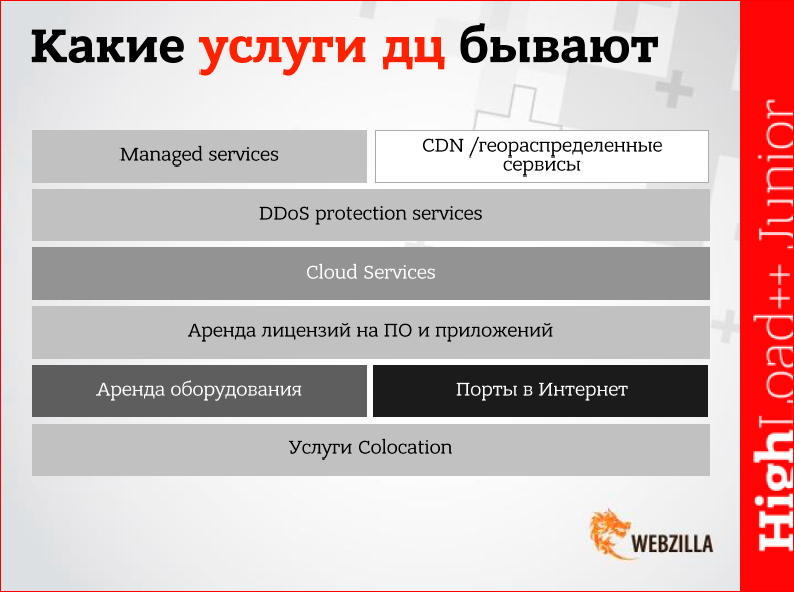
What are the services of data centers? Here I drew a layer of cake - from the most basic services to services that are based on the base. Now I'm talking about each of these services. I will say basic things, but it is not bad to speak them, because the format of the event obliges us to this.
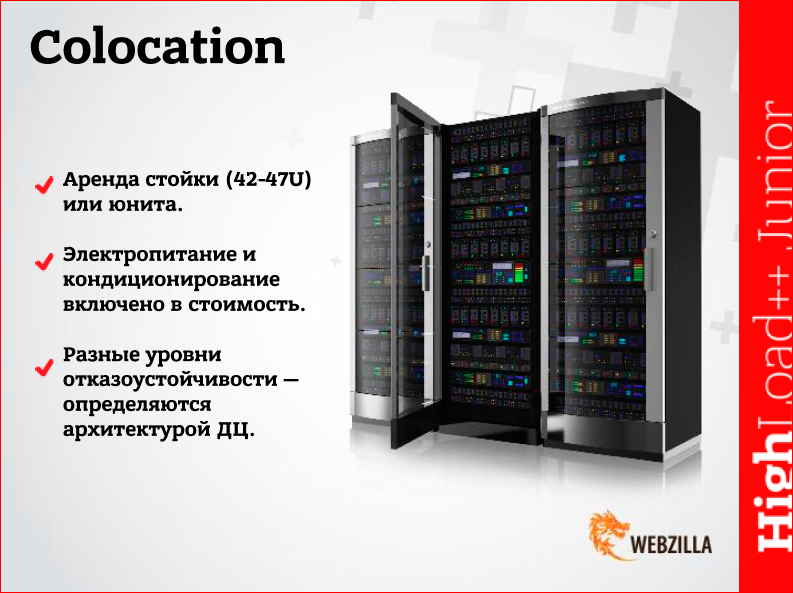
Colocation . In the picture, just, stand, which they like to show in advertisements. Rows of racks, raised floor, everything blinks beautifully. Everything is simple here. There are racks, there are units in racks. They are given to you for rent, you actually rent one one-thousandth, one millionth part of the data center. As part of this unit or this rack, you are provided with electricity supply for your equipment, some watts of racks, the rest of watts are at extra charge, respectively, cooling - it all works for you. The data center has a certain level of resiliency, which is determined by its architecture, its design, and you know that you can count on it. There are a lot of options - video cameras, electronic locks, physical racks and other fencing. These are such colocation services, they are more or less standardized, they are clear to everyone. This is a basic service — the very infrastructure of the infrastructures — where all the data centers start.
Rental equipment . We remember the definition of a data center as a business - a data center buys many, many different servers, buys a lot of disks, memory, and other components for them and is ready to give them to you for rent so that you can rent them to solve your problems for a month, a year, two, three years. The data center remains the owner of the equipment; you rent it for a while. The data center is usually responsible to those who rent the equipment for the performance of the equipment, and usually the data center provides replacement power supplies, hard drives, something else that may fail in the server. And the server can deny anything, including even the rails, in fact. Accordingly, such a service is also more or less clear, it exists.
Ports in the Internet . Here more interesting begins. By itself, a data center without connectivity to the outside world is very few people need, respectively, questions about Internet access begin. There are options - a shared port, a dedicated port, i.e. when the whole capacity is yours or, relatively speaking, you live in a communal port. There are options when you are given a fixed port of 100 Mbit or Gbps, or an option when you take a port with Kammit, but you are charged for the fact that the port is disposed of according to a burst.
There are also options that are especially popular in cloud services, when you are not charged by bandwidth, but by the number of either bytes transferred to or from bytes sent. Different nuances begin here, remember them for the future when you communicate with any cloud provider. You ask the question: “What does a cloud provider sell you?”. You think that it sells you MHz processors, GB of memory and GB of storage, but if you look at their final accounts for what they earn, you will be surprised that they usually sell you Internet bytes, bytes of data running between your virtual machines , many stories and more.
Accordingly, in addition to Internet ports, within the framework of connectedness, there are services related to propping up your autonomous system, providing pools of subnets of IP addresses for rent, etc. In Telecom, if you want, you can only talk about it an hour that the data center can to sell, or what you can buy in Telecom. We have the same overview, so short.
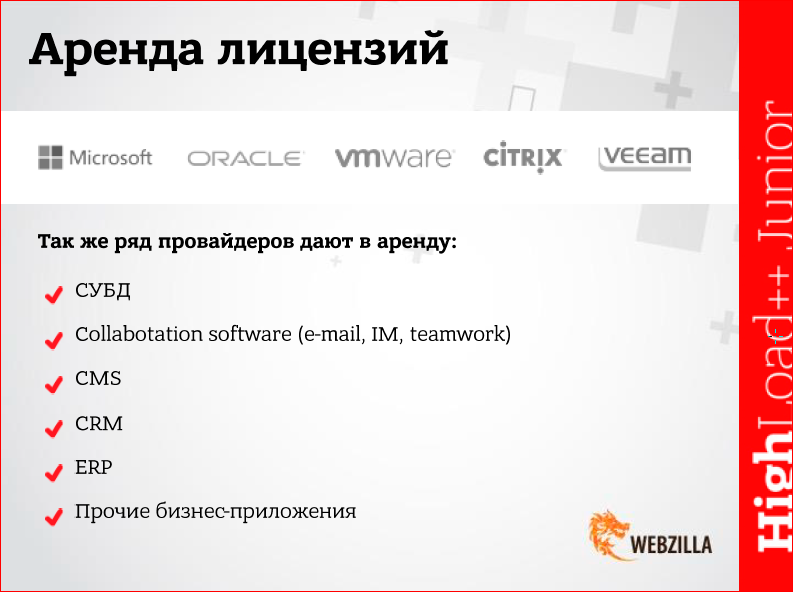
There is also a service such as rental of licenses. In addition to renting physical infrastructure, data centers like to lease software (software), because in any standard software license, say, from Microsoft, Oracle, etc., it is written that a license does not imply the transfer to third parties for rent, and for Such a task for all vendors has a separate licensing model - the licensing model for renting software. You, when you come to the data center, you rent a piece of metal, you can either roll your licenses, or say: “Guys, let me rent licenses such and such”, if you are using a commercial product, and not one that does not subject to commercial licensing. In addition to the license, many providers know and love (because they earn money from it) to lease higher-level things - business applications, CMS, CRM, everything that exists. They provide it for rent, and users rent it.
Cloud services . In cloud services, there are computing services and cloud storage services. The most popular, on hearing, is Amazon. There are many options. The idea here is that the effect of scale is the effect of technology. People take thousands, tens of thousands of pieces of iron, they deploy some kind of virtualization management environment, with the help of their specialists they set up this whole thing and ensure that you can buy a small piece of effectively used iron. So, iron is bought a lot, it is bought for a unit very cheap; there are few people who serve this system; software works efficiently. When you compare options - to rent a small virtual server or a physical server with the same characteristics, relatively speaking, 2-4 cores, 8-16 GB of memory and a little hard disk, then you understand that a virtual machine is much more profitable in terms of money than a physical server, just because such virtual machines live on a dozen-hundred server, and colocation occurs on one server, and not just a colocation server. So Cloud service is what many providers sell. There are a number of providers that deal only with cloud services and do not sell everything under them. For example, DigitalOcean only sells cloud services and is not profitable for them, it is not interesting to sell colocation.
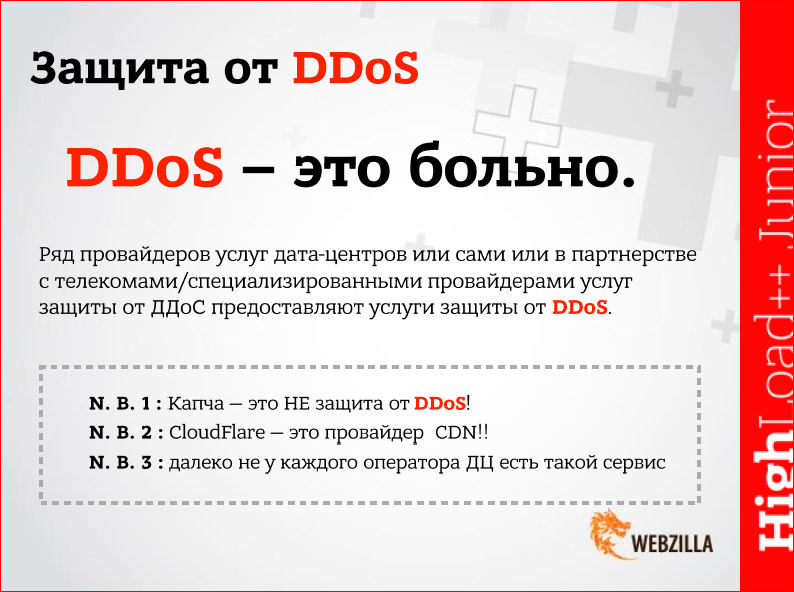
We rise above. DDoS is painful. DDoS comes to everyone who does what has competition in the market, and is interesting to people. Relatively speaking, if you have a certain web resource, for example, an online store, and if you are never unwary, it should be saddening you, because you are not needed by anyone - it hurts. Any resource — online media, an entertainment portal, an online game, an online store, whatever — will sooner or later be detonated, because there are competitors who do not want this portal, this resource to develop.
Specialized providers protect against DDoS, respectively, a number of data centers negotiate with someone, and together they provide these services. Someone does not provide these services, i.e. DDoS is not such a thing, not such a commodity as racks or equipment rental, someone already does this, someone does not. I know cases when people cried that they were being detonated, and they were simply told: “We have it written so in the agreement: if you are deaf, we have the right to disconnect you and terminate the contract with you”. This is real life, in one large European data center it is simply written in SLA: “Sorry, guys, you are dear, we have the right to turn you off, if you are long enough, we have the right to drive you out the door, it happened.”
Colleagues from the “Curator” like to talk for an hour only about DDoS - attack structures, attack types, statistics analytics, how it develops, what happens, why, how to deal, what reasons ... This is a long topic, but as part of the overview report, I wanted three things:
- Remember: the captcha protection mechanism is not a DDoS protection. This is a mechanism to control your users.
- There is a very popular idea that CloudFlare is a good free DDoS-protection. No, remember: CloudFlare is a CDN provider, and CDN and DDoS-protection are two different things.
- If you take the services of a data center, you obviously ask: “Guys, do you have DDoS protection, how is it implemented, and what will happen to me if DDoS is on my resource on your data center?” . Because not every data center operator has protection against DDoS, and not every data center operator, provider, will tolerate you if you are detonated. As experience shows, sometimes this is a revelation for people and a revelation is painful. Those. not only that detonate, the hoster also expels, referring to his own clause 6.8.13 of Annex 4 to the contract.
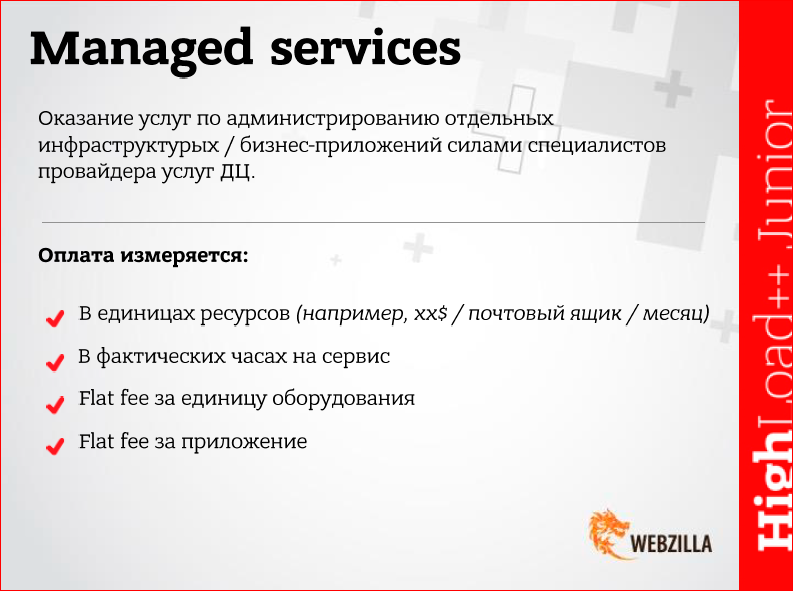
Managed services . Since we say that a data center is the provision of infrastructure for rent and a streamlined procedure for the provision of services, it is logical to sell these debugged procedures to consumers. And a lot of data centers provide services Managed services - this is the administration services or infrastructure applications, or customer's business applications. For example, colleagues from ITSumma earn their living only from this. They come to the client, they say: “They are, you have a server somewhere, let us administer it?”. Good business model.
You can administer anything, but more standard things, such as mail systems, some CMS are taken on administration more often, something more complex are taken on administration less often.This is usually paid $ X per mailbox per month, or simply people say: “The hour of our engineer’s work costs so much money,” then they say: “We worked this month on your requests for 12 hours, give us X * 12 money for this month". Or, as colleagues advertise, Flat fee for a piece of equipment: "Give 100 units for each server", or Flat fee for the application: "We will administer your CMS for $ 49 per month." There are such services, they also do not have everything, everything is in a different volume, but they exist.
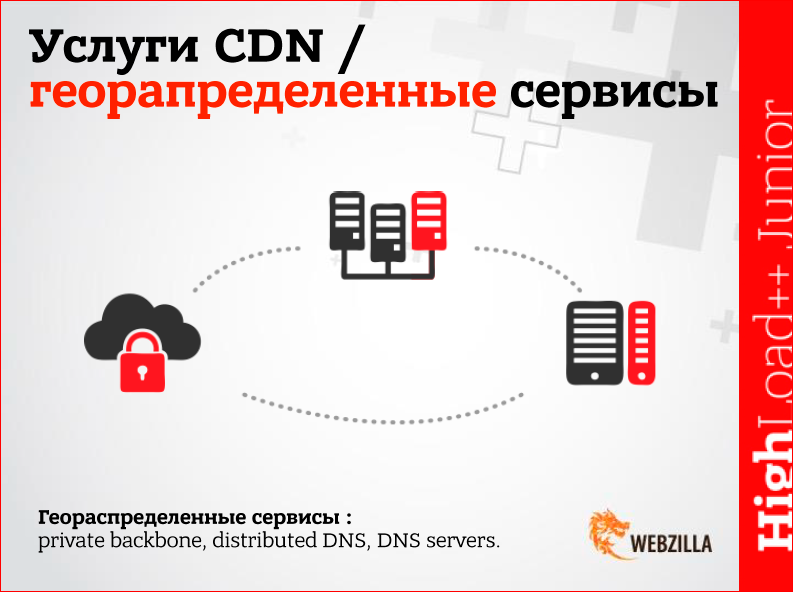
CDN services and geo-distributed services . Often, the provider has more than one site, and then we start talking about geo-distributed services. The first service that comes to mind for everyone is the CDN (Content Delivery Network). This is a separate class of services. Those.There is a class of DDoS providers that are individuals, with their math and their software, and there are people who deal with CDN. A CDN is also a separate mathematics within a separate infrastructure, a separate technology. It happens that some data centers partner with some CDN provider, or there are cases, for example, when a holding includes both a data center as a business and a CDN provider as a business. It happens that the data center simply does not deal with CDN, because it is there alone, and a CDN from one point looks somehow strange. This is the first class of services, which is geo-distributed and which can be found in data centers. If the network of data centers deals with CDN, it’s good that at least at their network level, at the level of communication technology, there is integration between CDN and their service,and in the event of a problem, the game does not begin, like our satirist: “Do you have any complaints about buttons? There are no complaints about the buttons, look for a problem from the other side ”. In addition to CDN, as a geo-distributed service, there are a number of other services - private backbone, distributed DNS, fault-tolerant hosting of distributed DNS zones. There are many options, they exist, you can also talk with them.
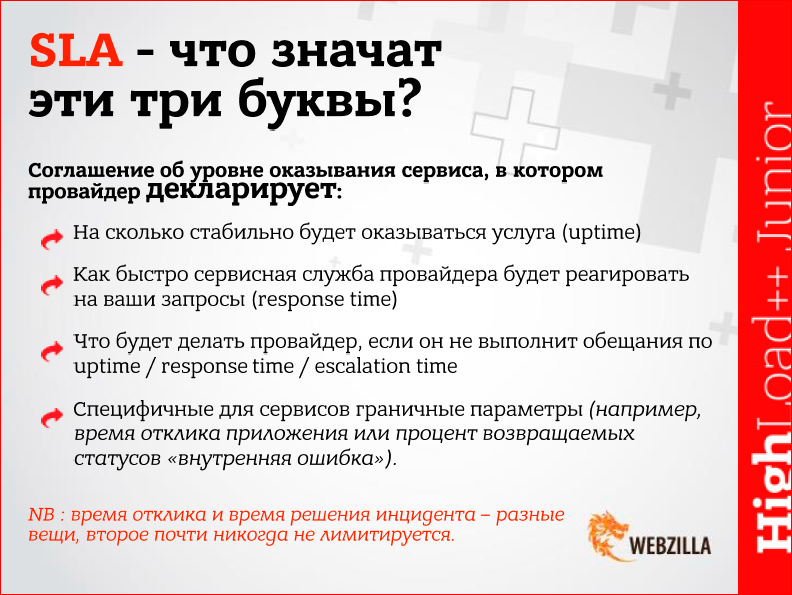
All services have three magic letters - SLA, which people sometimes consider to be a paradigm. What is SLA? SLA is a service level agreement in which the provider declares (the keyword declares):
- how stable the service will be;
- how quickly the customer service will respond to your calls, and how quickly it will escalate your calls if it responds incorrectly to them;
- what the provider will do if he does not do what he promised;
- and for each service, it usually happens that there are some boundary parameters of the signs - “works / does not work”. Services are different, measured in different parameters, they have different parameters - a sign of whether it works or does not work, because there may be a situation when it works, but slowly. In a good SLA, slowness criteria are written;
And again, by experience, a very important thing (on the slide is written in red) - the response time of the service center of the data center, the service provider and the time to solve your problem are two different things that are not correlated with each other. Those.Response time is the time during which your request will be answered by an engineer, adequate, not by a robot like “Thank you, we received your request”, but a response from the engineer as a matter of fact. This is usually an hour, two hours, four hours, 24 hours - this is all spelled out in the SLA, but the time to solve your incident, i.e. when the answer is not “OK, we heard that you have a problem,” but “OK, we have solved your problem this way and that and this will not happen again.” Here is the time before this answer, i.e. the time to resolve an incident is almost never regulated in SLAs and contracts. And it must be remembered that the response time and the time to solve a problem are different things, and very different.

What is Uptime. The availability of any service is determined by the percentage of time when it works. Accordingly, there are several axioms. The higher-level service, the lower its uptime, because it depends on the uptime of the underlying services. It's very simple - if electricity is out of date in our data center, our mail system will stop working - this is physics. Those. the mail system itself may break. Those.It may be a situation that a glitch will occur in the software, the software does not work, but the server works, colocation under them works, and the uptime of the mail system will be lower. But in the event that the underlying infrastructure service dies, the superior services die by definition. It is impossible to calculate the mattress, you can evaluate the "floor, finger, ceiling." Accordingly, “on average in the hospital” a good level is three nines, 99.9% uptime. More than four nines on one data center is a criterion of luck. Those.if your service lives in a data center and for the year showed uptime above four nines, then super, you are lucky, all is well. But no one can guarantee that in the next year you will again reach this uptime. When uptime is told to you five nines, six, seven and more nines, it’s like in the old Armenian joke that Sochach invented 7 star stars, although in France there are only 5.
What do we need? Before looking for a data center provider, answer the maximum number of questions for yourself - what do you want to do and why?

Those.What will your project have temporary categories? Who will be the consumer of your project? Will it be an internal or external project, short-term or not, will it be associated with the development and writing of some kind of software, or will you simply install an email server so that it just works?

Answer your questions about resources.
- Everyone for some reason thinks that money steers the world, and the key question is money. In life, everything is a little more complicated, the key question is people. Those. what kind of people do you have, what are you ready to do yourself, and what services will you have to buy on the side, from an outsourcer or from a data center?
- The second sore point is timing. When you need to get when you need to do?
- The third question is technical limitations. Those.relatively speaking, if your entire team can program, but cannot administer, then you probably need the services of an administrator. Or vice versa, if people in your team are involved in implementing the Microsoft project, then in order to program something you will need to look for a programmer.
- And only the fourth most important issue is a matter of budget constraints, i.e. How much money do you have for all that you have in mind?
Understanding these questions, you should understand one more question that arises, which you can be asked later, therefore it is better to ask yourself in advance. Inhouse or not? Those.you have to understand that yes, we now have a bunch of providers, yes, we have Google, we have Amazon, we have Microsoft Azure, we have dozens of data centers. Everything is super. It must be remembered that the variant with its own server or, relatively speaking, the variant with two servers under the table is not canceled, it always exists as an alternative, and it also needs to be calculated. He will most likely be sadder in time, he will most likely be sadder due to technical limitations, because if we don’t have something, then we don’t. But it may turn out to be better in terms of budget constraints - if we already have iron, we don’t need to buy anything. Such cases are also.
Accordingly, it is necessary to determine the resources and clearly define a task for yourself.
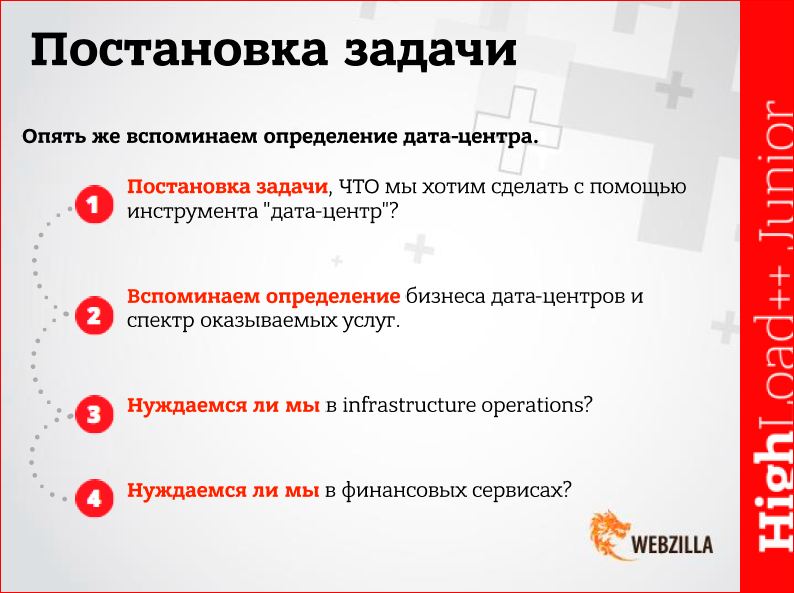
First you need to understand what we want to do, then we remember that we are talking about business data centers and, based on this, we are looking at whether we need administration services, management services, whether we need help from data centers, infrastructure procurement so we can rent it? Because we can come to the data center and, relatively speaking, rent a rack, spend a million money and buy hardware to put in that rack. Or, we can come and say: “The data center, we want to rent a rack stuffed with such a hardware from you”, and in fact in this case the data center provides financial services - it buys these pieces of iron and leases them to you. This is a normal practice.
We get to the most interesting part - how to choose a provider?

There are two problems:
- All providers provide a different range of services, and often the same name corresponds to some different things.
- Between you and any data center there will be two more participants on whom you have little influence and the data center also has little effect - this is telecom and the state.
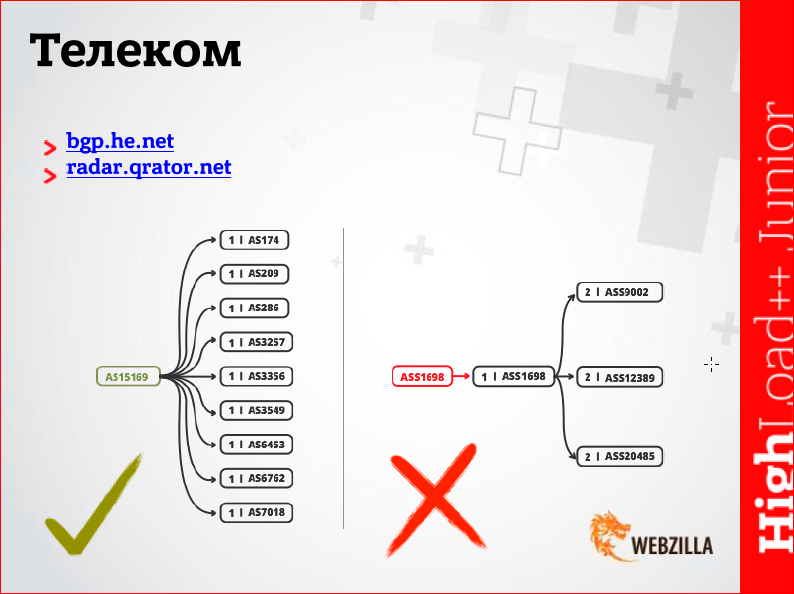
About telecoms. A data center without coherence, without the presence of providers is some kind of wrong data center, because either the users of your service will not see or see your website lying poorly with this provider, or you simply cannot access this provider. . There are links on the slide where you can look at the autonomous system of any data center. Accordingly, Hurricane Electric and qrator.
On the right, there is an option that is not very good, when there is a certain provider who says that he is good and cool, but we see that he is in fact a reseller of another data center, and already another data center has some very large connectedness, well, he has it, but not fucking awesome. And a good option on the left (in fact, this is Google Aps), when the provider itself is connected with a large list of highly respected providers. Accordingly, the better connectedness (this can be seen on services), the better. The greater the chance that from various points of the Internet, users of your website or service will have adequate access to it. Those. there is no guarantee, but the chances are increasing.

State. We are talking about Russia. In Russia, there are two options: you use a Russian data center or not a Russian one. If you use a non-Russian data center, then the state can “make you think” about the flow of documents and relationships. If you even work with a Russian data center, then you should not think that the state will lag behind you, because in Russia now more and more laws are being adopted related to personal data given by Russians. Here we have a law on bloggers, under which any site with attendance of more than 3 thousand people per day falls. We also have a law on countering money laundering, terrorism, i.e. there are a lot of laws written in our country that affect the Internet, affect the hosts, affect the owners of Internet resources. This must be remembered, this must be known.
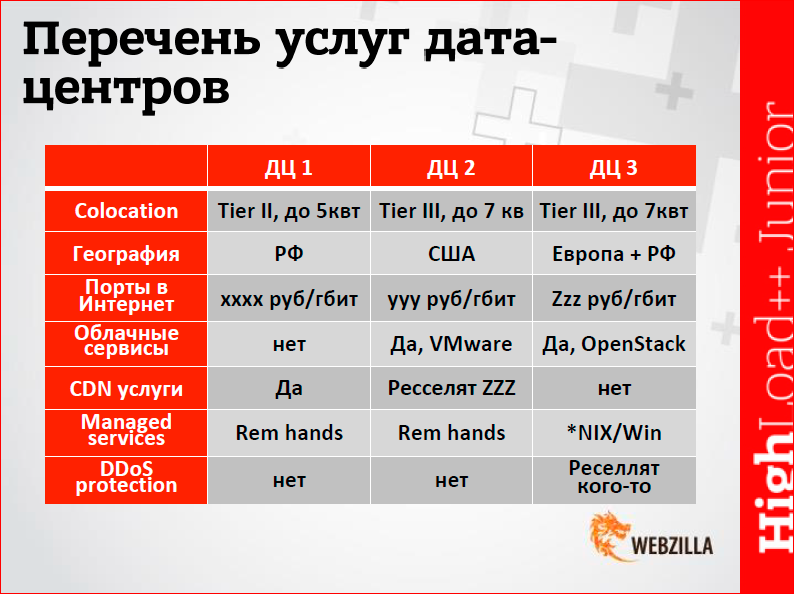
Suppose we made just such a tablet. We wrote out a bunch of data centers, their services and painted them the way we want. Below I will explain why we need such a sign.

How does the data center usually search for anyone who wants to buy data center services? I tell you what I see cases in 80% of cases in the last 6 years, how I sell data centers. This is an algorithm for 80% of customer communications. Customers come and say: “Guys, we now have a certain pool of iron, we want exactly the same, but in the data center. We thought and decided that we need three such servers, two such servers, five such servers. We want this in the data center. ” Accordingly, any potential buyer sends this request to some pool of providers. Anyone who knows everyone sends. Because it is foolish to come to one and buy dearly from him, one must buy cheap. In response, all providers send certain prices, simply fill in the numbers in the plate - configuration server No. 1 - 100 money, configuration server No. 2 - 150 money per month, etc.The client receives these signs, compares, says: "See, and your neighbor offered two rubles cheaper." Those.trade is conducted, a certain price reduction is obtained - everything is super. And once again the price reduction, the signing of the contract, peace, friendship, chewing gum. The tender procedure was the choice of the best at the price-offer.
There is such a good demotivator:

The problem is that this procedure involves 80% of consumers of data center services, and the task of data centers is still not to sell the cheapest price, the task of data centers is to earn profits for its shareholders. And everyone understands this, and everyone knows that 80% of clients will go through this procedure. Accordingly, the dog rummaged somewhere. Do not think that you invented the mechanism of push-ups for the price and display of offers to each other data centers as a kind of mechanism for a new word in the tenders.

Therefore, you need to do differently. First you need to write the technical requirements.. Technical requirements are the framework, limitations and formalization of what we want to do approximately, with large strokes, without prescribing the number of cores, MHz, IOPS, and others. Technical requirements for what we want to implement. And having technical requirements, we define the classes of services we want.

Suppose we want to make a very large site, which will have a million users, and they will be all over the world. If users around the world, but probably we need a CDN. 1 million users - we probably need a lot of iron. We also want the resiliency there to be higher than three nines - we probably need two sites. Those.relatively speaking, define what you want. So, we need to see this from the Internet, and we want to place our AS-ku, and we want our website with 1 million users not to be distributed yet.
Those.You have a class of services that you want. You then look: and which of these classes of services is the most important for you. Network connectivity, cool hardware, awesome cloud technologies, because you live in docker, you learn how to deploy in docker nicely, and you want this docker to work? Or it is important for you to have the most awesome CDN, because you have users on all five continents. After that, you decide what you want to have uptime, how adequate, how fast, sane that provider should be with whom you want to negotiate.
Again, look at the geography and understand where this provider is better to be. Because if you want to make a service for users, it is technologically logical to place your platform somehow not far from the users. Because if you make a website for Russians and in Russian, it is logical to put it in Russia, or at least in Europe. And if you are making a website for South America, then you need to look for a platform either in South America or North America, but, for example, from Russia, making a website for South America is very bad.
Accordingly, you have such structural insights.

Next you need to understand about SLA. Any data center declares its SLA, based on its knowledge of how it provides service, and you understand that if you even pay the data center a little more money, but it does not make this SLA, it will not make it. He will promise him, but he will not. Your own project, any website, any that you place in the data center, as a result should pay back the money spent and make a profit. It is unlikely that you will do some highload project just for fun, spend money and time on it. Most likely, you will do this so that this money will somehow return - through advertising, through subscriptions, through something. Those.in the end it will be a business that someone will pay for. In short, this business will have a person who spends money and then returns it. This person should know the requirements for availability, scaling, reliability of the service that he wants to build. But not abstractly, so that “the type always works, never falls,” but more substantively. This is on the one hand.
On the other hand, you have some technological limitations inside. Those.if you don’t have a monitoring system and you don’t know during the day that something’s broken, then it’s stupid to demand a downtime from your hoster for no more than five minutes a year. You must demand from your provider that level of accessibility that you can control yourself. If you don’t see for yourself that your site for ten minutes is not very visible from the Deutsch Telecom network, then it’s silly to demand some kind of super SLA on a telecom.
You still have internal limitations on the maturity of the team, when you do not have monitoring or do not have well-established procedures inside you. Those.you understand how much you want to be on SLA, and you understand how much you can on SLA. And you should demand such an SLA from your future provider, because it is silly to demand a mega cool SLA, since it will be very expensive, and demand an SLA that does not suit you - why should you look for a provider that does not suit you right away?
Thus, you define the SLAs that you expect from the provider after you determine what you want.
There is also such an interesting slide, which 80% of people forget about:

Suppose if you decide not to contract with a Russian provider, but with a European or American one, then there are people in your company who are called lawyers, and there are people who are called accountants.
Not every lawyer will accept a public offer for the service posted on the provider's website in English, not everyone. It is a pain. Not every accountant agrees to pay with Paypal or a corporate credit card - in Russia this cannot be done. Not every provider agrees to discuss his contract, because the results of a lawyer’s work are visible when he rules contracts with contractors, but there are many data center service providers who simply say: “No, guys, we have a template - here you enter, What do you want, here is the name, here is the place for printing, here is the date of signing the contract. Everything else is not corrected. " And not every lawyer will agree on such a structure of relationships.
State. If you want to pay the abstract Amazon money ... Well, now they have already learned how to do it, but two years ago to pay money to Amazon, it was a periodic quiz, that is because foreign economic activity, because “please bring the contract printed with original stamps. Or not Amazon, but a smaller foreign provider got into an “eeee” pose, which does not pass.
Here, from life experience. People come and say: “We need a project very urgently, we take off, we have a deadline. For a week, we negotiate — a ton of iron per kg of money a month, a hand? ”-“ By the hand. Send the contract - we sign ". After that, for three months, the lawyer — an accountant; Moreover, such a circus does not depend on the amount of the contract, i.e. it can be per ruble and million rubles per month. The volume of lawyers and accountants does not depend on it. And if you want to work, for example, with a non-Russian data center, you should be aware of this risk not at the time when your deadlines have passed, and you need to be in production tomorrow, but at the moment of choosing a provider.

Algorithm. If you already have an understanding of what data center services, in principle, you want, and there are some descriptions of technical requirements, the algorithm is very simple:
- -, , , Google, , , , -.
- , , , . , , DDoS-protection, a DDoS , , .
- , SLA . legal legal SLA, , , , . , response time 24/7 20 . - - , , — , — . — . , SLA , . , , . SLA: « , , , , ». SLA, — . , SLA , SLA . , SLA, , . SLA , - .
- After this, sift those who may not be suitable for you. Because you still have a project budget, and if you have money for Equinix and Recepses, I am happy for you, and you understand why you should buy them, their services are great. You have very critical, you have very good and high-budget projects. But, most likely, "Equinix" and "Rexpeys" you also have to strike out.
- After that, you show the documents that are stored on the website or on the contract templates of these providers, accountants and lawyers, and say: "Guys, do we have a chance to sign such an agreement?". Then we wind off on that slide, which lawyers / accountants do not like, and you will also cross out someone else.
So you filter out a certain number of data centers, but something will remain. And already these data centers you are sending a request for a proposal.

RFP. What is included in the RFP. You are writing a certain description of the project: we want to implement a site on which users will lay out cats, there will be 1 million users, they will live everywhere, communicate in different languages, they will have chat, relatively speaking. You write what you want from the provider, from the project, so that this site with 1 million cats earned, and you write how you see the development of your project in a year, two, three, if you work with a data center provider. And then write the SLA that you want to see. And that initial configuration, with the help of which you want to start implementing your future project with 1 million cats.
This RFP contains the time you want to cooperate, your planning horizon is one to two to three years; it contains the technology you want; it contains your expectations about the SLA, and it contains the starting point of what to quote.
This path, in contrast to the path that everyone usually follows, is no longer about the fact that, like, “guys, first let us agree on the most minimal money, and then we will get upsell in the form of SLA, upsell in the form of everything else”. Here you immediately get away from these unpleasant pitfalls, when people say that “oh, and you also wanted to be supported in Russian? No problem. The price tag is multiplied by two. ” Or you say there: "We want something," and you: "Multiply by two, too, or we generally cannot."
This RFP helps you, after you have eliminated those to whom you sent this RFP, to find a provider who will not disappoint you later either in the class of services you want to receive or in the SLA communication procedures you expect from them. Because I know cases when people every 72 hours just get a robot machine, like, “OK, we received your request, we are working on it.” Because the base SLA is three days for the “OK” response, and there is no escalation time. I also saw such SLA at data centers.

Remember that any data center is not only the price of the service that is written on the site. The site is always (we remember that everyone is lying) are written or promo, or some specials. offers, or the fact that for some reason the data center can sell cheaply. But selling something cheap, the data center understands that it will return its profit on those things that will be associated with it, so that it will sell cheap, because it will still be necessary for you in the complex.
Those. the service is not only the price, but it is also the staff who provides the services. And you are looking at what the data center is having, and if you wish, try to avoid explicit resellers and explicit sales agents who do not add any additional service themselves. Those. relatively speaking, there is a data center, and there is a site reseller who resells some resources from it. There, in fact, there are two people - students who accept payments from the card, take their 10%, and stir up to make it work in the data center. You don't need this option. And if, for example, there is a data center that rents only glands, and the guys take the glands for rent, deploy the virtual machines on it and sell the virtual machines to you, then you may need such a reseller, because you need virtuals, but this data center.
Look carefully, if you buy not directly from the data center, but from its reseller, what value does the reseller give? I know the cases when the English data center is taken and the Russian guys resale it. The only value of the guys is that they work as translators from Russian to English and vice versa. Those. Russian client writes in Russian reseller, reseller translates it quickly into English and writes in English to the Hindus in the support of the data center. Here it is valuable - communications in Russian, because the Indians speak English badly, in general, they do not speak Russian at all. In that sense, your reseller might be helpful.
If you do not see the obvious value of the reseller when you make the list, cross it off, because the reseller is an additional delay in the response time and this is no liability for the SLA, because the reseller can promise anything to you, but in the contract with the data center you will see nothing.
Also remember that the duration of cooperation matters. Actually, if your project is planned with good luck forever or for many years, write about this in the RFP that “Guys, if we are fine, then we are planning a three-year collaboration.” If the data center is sane, then the price tag for services will fall by 10-20%, which is good. And if you write “we want a Superdome for a month or two,” then most likely you will be sent. Although in reality, I regularly receive requests for a non-Intel architecture: “Can you give us a 16-processor pSeries for a month?”. The pSeries 16-way is half a million dollars worth of garbage, very specific. We say: “Where do we find it for a month?” And what shall we do with her later? ”
Remember that fast, cheap, high quality - select any two. It works in any business, in data centers it also works. Those. fast, cheap, high quality at the same time - unfortunately, it does not happen. We must choose two out of three. Remember that data center providers do business, earn money for you, thanks to the fact that they invested a lot of money in infrastructure and debugged the procedures for providing this infrastructure to their clients for rent. On this data centers make their money - on the effect of scale, on attracting investment, on expertise in operation, on this all they earn money in market conditions.
Contacts
» Igor@webzilla.com
This report is a transcript of one of the best speeches at the training conference for developers of high-load systems HighLoad ++ Junior .
That year (this is 2015), the concept of the conference consisted of a number of training reports from the pros (which are very much in the subject). Igor is now working in the team that launched Servers.ru , and this is now probably the most aggressively developing hoster.
Also, some of these materials are used by us in an online training course on the development of high-load systems HighLoad.Guide is a chain of specially selected letters, articles, materials, videos. Already, in our textbook more than 30 unique materials. Get connected!
Well, the main news is that we have begun preparations for the spring festival " Russian Internet Technologies ", which includes eight conferences, including HighLoad ++ Junior .
Source: https://habr.com/ru/post/319800/
All Articles